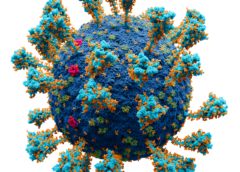On November 26, 2021, the World Health Organization classified a new COVID-19 variant as a variant of concern and named it Omicron. As of December 4, 2021, Omicron has been identified in the United States and is reported now in more than 20 countries.
 CDC has been actively monitoring and preparing for this variant and continues to work diligently with other U.S. and global public health and industry partners to learn more.
CDC has been actively monitoring and preparing for this variant and continues to work diligently with other U.S. and global public health and industry partners to learn more.
Emergence of Omicron
On November 24, 2021, a new variant of SARS-CoV-2, B.1.1.529, was reported to the World Health Organization (WHO). This new variant was first detected in specimens collected on November 11, 2021 in Botswana and on November 14, 2021 in South Africa.
On November 26, 2021, WHO named the B.1.1.529 Omicron and classified it as a Variant of Concern (VOC). On November 30, 2021, the United States designated Omicron as a Variant of Concern, and on December 1, 2021 the first confirmed U.S. case of Omicron was identified.
CDC has been collaborating with global public health and industry partners to learn about Omicron, as we continue to monitor its course. CDC has been using genomic surveillance throughout the course of the pandemic to track variants of SARS-CoV-2, the virus that causes COVID-19, and inform public health practice. We don’t yet know how easily it spreads, the severity of illness it causes, or how well available vaccines and medications work against it.
Despite the increased attention of Omicron, Delta continues to be the main variant circulating in the United States.
What We Know about Omicron
Infection and Spread
- How easily does Omicron spread? This variant likely will spread more easily than the original SARS-CoV-2 virus and how easily Omicron spreads compared to Delta remains unknown. CDC expects that anyone with this infection can spread the virus to others, even if they are vaccinated or don’t have symptoms.
- Will Omicron cause more severe illness? More data are needed to know if Omicron infections, and especially reinfections and breakthrough infections in people who are fully vaccinated, cause more severe illness or death than infection with other variants.
- Will vaccines work against Omicron? Current vaccines are expected to protect against severe illness, hospitalizations, and deaths due to infection with this variant. However, breakthrough infections in people who are fully vaccinated are likely to occur. With other variants, like Delta, vaccines have remained effective at preventing severe illness, hospitalizations, and death. The recent emergence of Omicron further emphasizes the importance of vaccination and boosters.
- Will treatments work against Omicron? Scientists are working to determine how well existing treatments for COVID-19 work. Based on the changed genetic make-up of Omicron, some treatments are likely to remain effective while others may be less effective.
Where has Omicron been Detected in the United States
CDC is working with state and local public health officials to monitor the spread of this variant. This map shows the states that have detected at least one case of COVID-19 illness caused by this variant. Omicron will be included in variant surveillance data on CDC’s COVID Data Tracker when it can be reliably estimated at a low frequency.
CDC Warns of Salmonella Infections Linked to Recalled Raw Frozen Breaded Stuffed Chicken


